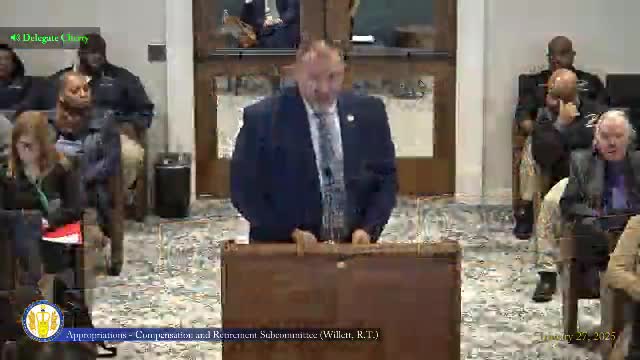Subcommittee hears unanimous support for classifying 911 dispatchers as first responders; action postponed
Get AI-powered insights, summaries, and transcripts
Subscribe
Summary
A Virginia House subcommittee heard testimony from dispatchers, firefighters and law-enforcement groups urging inclusion of 911 telecommunicators in enhanced retirement benefits. Committee members postponed final action to allow further review.
Delegate Cherry told the subcommittee that when someone dials 911 "there's someone who answers that phone, and they are the first of the first responders," and urged the panel to reclassify telecommunicators so they can access enhanced retirement and mental-health benefits.
The testimony came during a multi-bill presentation on legislation that would extend enhanced retirement or hazardous-duty recognition to telecommunicators at both the state and local level (HB 1563, HB 1564 and HB 1619). Speakers representing localities, public-safety associations and dispatchers described high stress, understaffing and workplace trauma and said reclassification would help recruiting and retention.
"They just don't answer the phone saying, 'Can I help you?'" said Lieutenant Sandy Springle of the Suffolk Police Department. "They help moms that are crying, screaming, hysterical because their babies aren't breathing."
Lauren Parker, a Loudoun County Fire and Rescue dispatcher, described guiding a mother through CPR for an unresponsive 6-month-old and said 911 telecommunicators endure "levels of PTSD and cumulative stress that are on par with, if not exceeding, those experienced by field responders." Thomas Dolan, who identified himself as a director at a 911 center and an APCO vice president, said the profession faces high attrition — he gave vacancy figures in the 25–30% range — and that "we need your help now."
Committee staff summarized a JLARC (Joint Legislative Audit and Review Commission) study referenced by witnesses, saying JLARC ranked statewide 911 telecommunicators highest (4 out of 4) on "level of public safety responsibility" but lower (1 out of 4) on a separate "level of demand" metric; staff also noted JLARC identified alternatives such as more time off, higher pay or mental-health benefits as other retention tools, and that about 15 states had hazardous-duty retirement for telecommunicators as of a two-year lookback. Staff noted the study did not itself recommend specific groups for enhanced retirement but provided comparative rankings.
After testimony from dispatchers, sheriffs, state police and firefighter representatives, a committee member moved to "pass this bill by for the day" for HB 1563, HB 1564 and HB 1619 to allow more work on cost and implementation. The motion passed by voice vote. Committee members said they would continue to work with patrons and stakeholders.
The bills remain active in the subcommittee; members stressed they sought additional fiscal and implementation detail before advancing a final recommendation.
